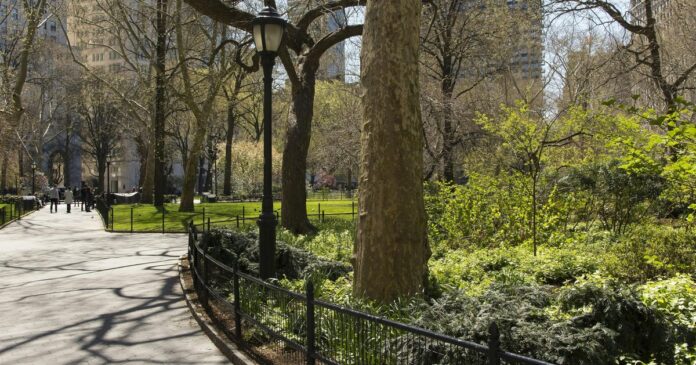People who live in areas with trees and plant life are more likely to stave off cognitive decline during middle age than those who live in less green areas, according to new research on the impacts of residential environments. The findings add to a long list of benefits linked to neighborhoods with abundant green space.
A long-term study out of Boston University’s School of Public Health looked at decades of data on risk factors for chronic disease among women, including common precursors for dementia and Alzheimer’s disease. The researchers examined how green exposure during midlife affects cognition, which may begin to slow down 20 years before recognizable symptoms appear.
In women who possessed a gene known to cause Alzheimer’s disease, the study found that living in a green neighborhood slowed the rate of cognitive decline by three times. Residing in areas with more green space was also found to slow a person’s annual rate of cognitive decline, researchers said.
Notably, the cognitive benefits of green neighborhoods were greatest in poorer and densely populated areas.
“Our results are important because they shed light into the cognitive benefits of increasing green space exposure at a population level, particularly among vulnerable subgroups of the population,” said Marcia Pescador Jimenez, assistant professor of epidemiology at BUSPH.
The study relied on surveys from nearly 17,000 nurses ages 70 and older who were enrolled in a cognitive assessment program. They completed telephone surveys up to four times over an average of six years each between 1995-2008. The researchers used satellite images to measure greenness in the areas surrounding the study participants.
Recognizing the relationship between green space and cognitive decline is significant because previous research has shown as much as 40% of dementia can be prevented or delayed worldwide by addressing risk factors that can be modified during midlife. That includes both habits and environments.
“Our finding for participants living in neighborhoods with lower socioeconomic status is consistent with the theory of equigenic environments, which suggests that greenness might be important to reduce socioeconomic health inequities,” Pescador Jimenez said.
The research adds growing evidence about the benefits of living in places that have ample green space, particularly in urban environments.
Researchers at the University of Pennsylvania’s Urban Health Lab have shown that greening vacant city lots reduces rates of depression among residents who live nearby. A study of 541 vacant lots throughout Philadelphia found that those with green interventions, such as trash cleanups, reduced feelings of depression by 41.5% among residents living within a quarter mile of revitalized lots. Research has shown that people with depression have more than double the risk of being diagnosed with dementia later in life compared with those without it.
Among children, more daily outdoor exposure is associated with higher cognition scores and a lower risk of emotional and behavioral problems, one study in London found.
Another study published earlier this month found that in four U.S. cities, living near green space and by bodies of water lowered the odds of people having hardened arteries. That research also found the greatest benefit among Black residents living in poor neighborhoods.
Other research has shown connections between access to green space and benefits such as lower blood pressure, reduced anxiety, improved mood and enhanced immune system function.
“The findings emphasize the importance of prioritizing the preservation and creation of green spaces, particularly in (low socioeconomic status) neighborhoods, as a means of promoting cognitive health later in life,” Pescador Jimenez said.



